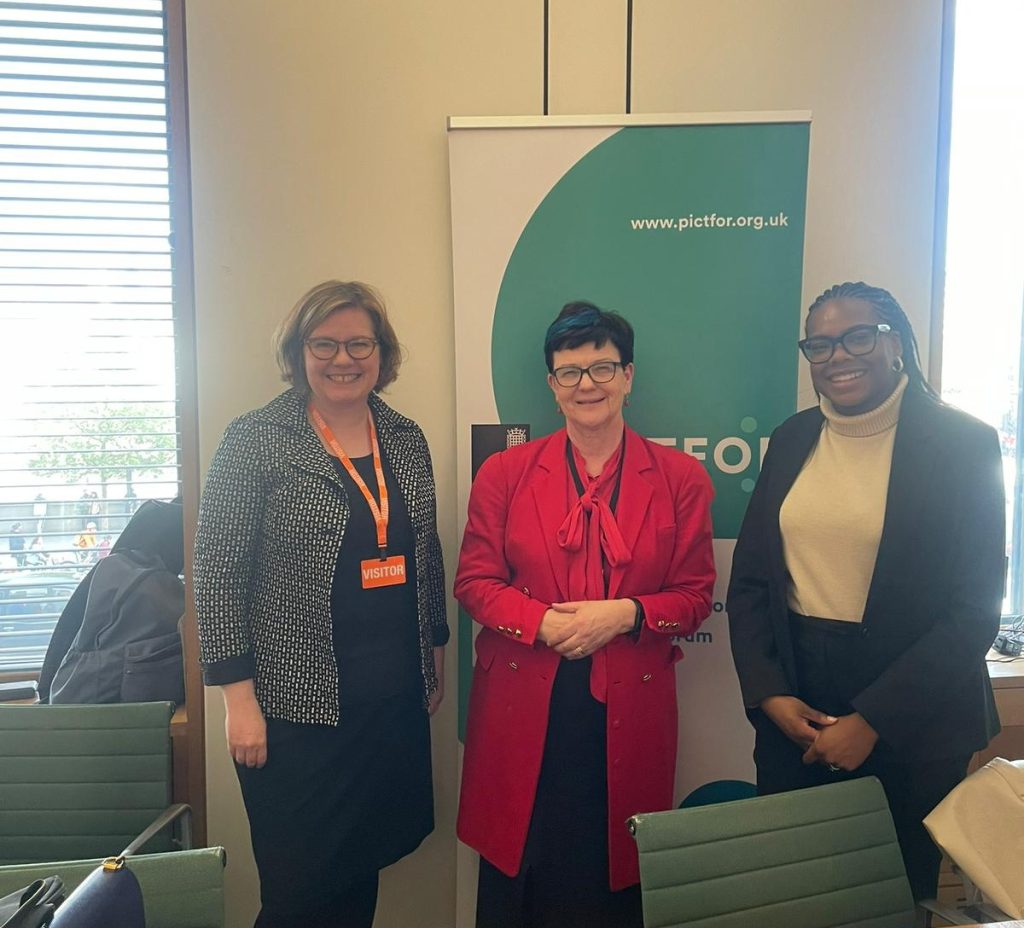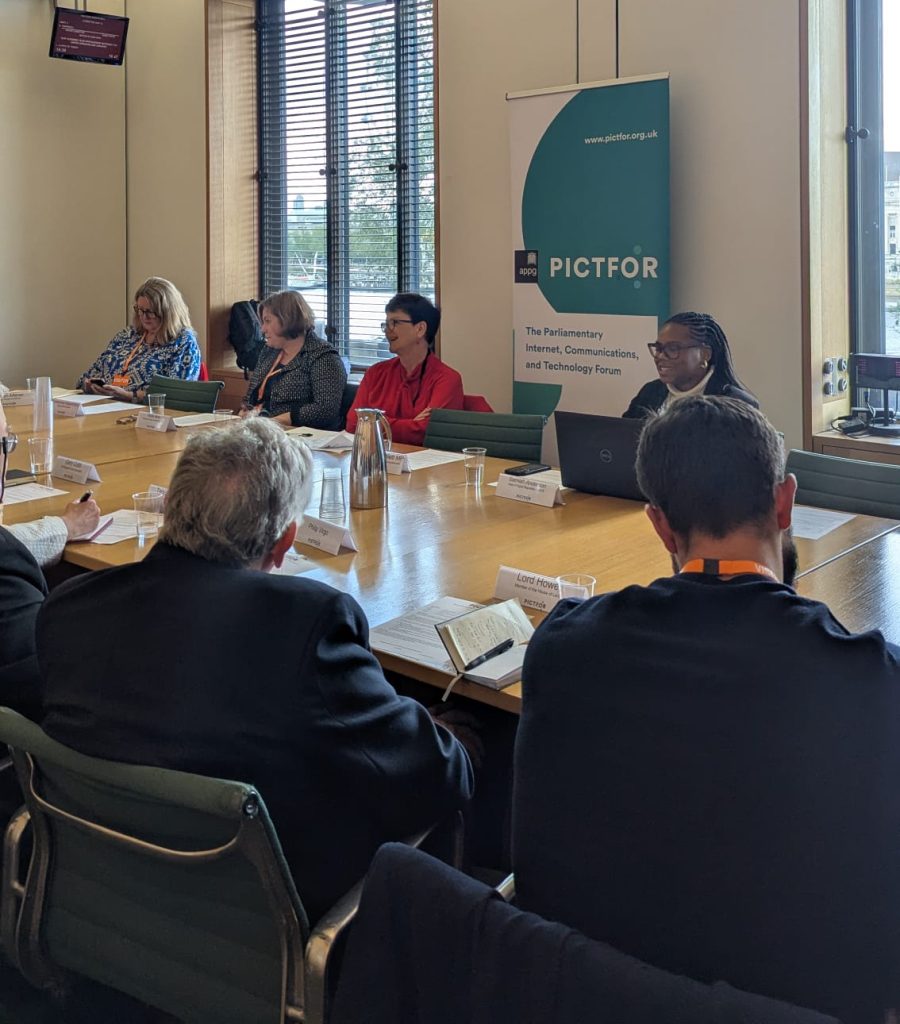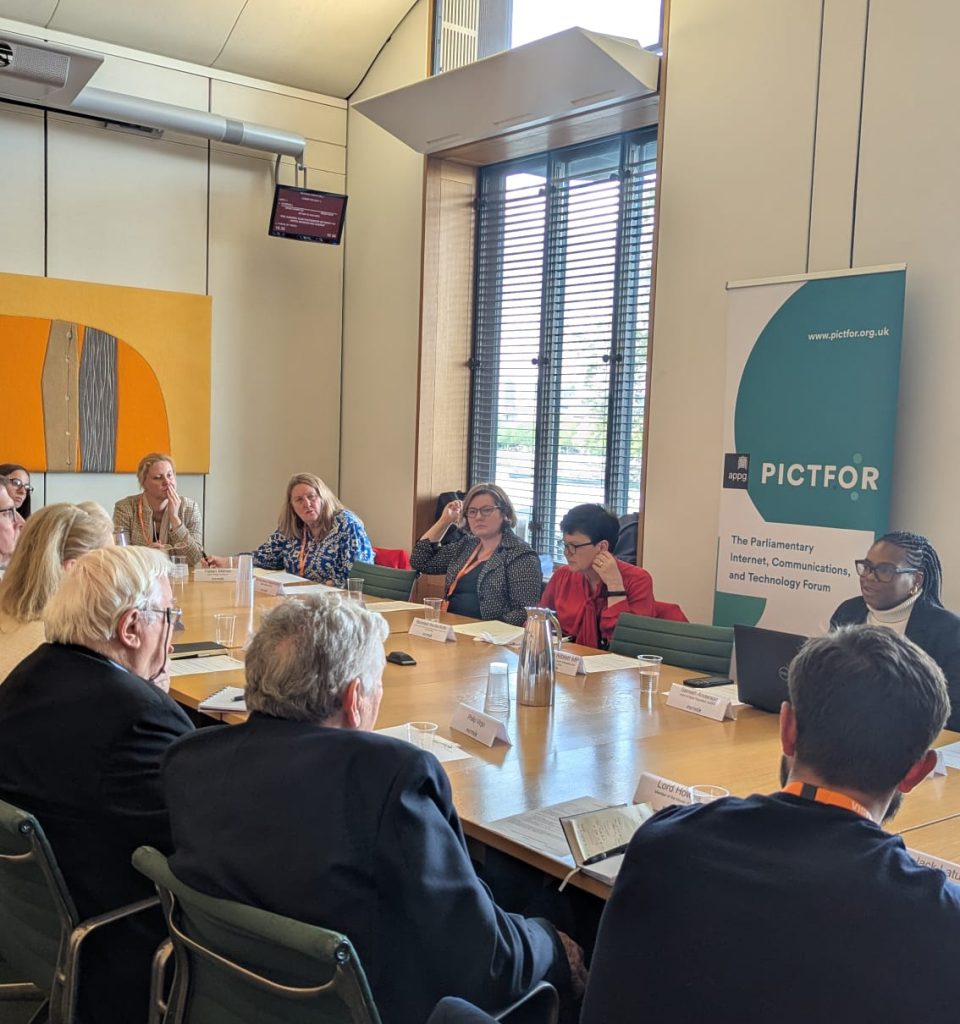On Tuesday 22 April, PICTFOR hosted a roundtable, in which Parliamentarians and Industry Members discussed how we can utilise advances in technology to provide access to community, how we can mitigate online harm, and what best practices look like in terms of online community building.
Baroness Neville-Rolfe, PICTFOR Officer, opened the meeting by welcoming attendees and thanking everyone for their dedication to advancing the digital economy and online communities. She introduced the first speaker, Kellie Mote, Programme Accessibility Lead at Jisc.
Kellie Mote began by explaining that while Jisc is best known for its technology services and products, much of its work focuses on the intersection where people meet technology. Kellie emphasised that Jisc’s approach is guided not only by technical expertise but also by empathy and a commitment to helping individuals develop skills, build confidence, and feel connected in their roles, regardless of their level of experience.
Kellie highlighted Jisc’s support for a range of professional communities, noting that one of the largest is the accessibility community. This accessibility community is dedicated to ensuring that all staff and students, including those who are deaf, disabled, or neurodiverse, can fully access digital content and work independently with technology.
Kellie noted that Jisc’s online community is deliberately flexible and multi-platform to maximise participation. In addition to Teams, Jisc supports engagement through JiscMAIL email discussion lists and monthly Zoom drop-in sessions. Emphasising the value of community-led initiatives, Kellie explained that members have been encouraged from the outset to take ownership of issues important to them. This has led to the formation of groups such as the Accessible Maths Working Group, which addresses one of the most challenging areas in accessibility. Other members have formed informal ‘buddying’ groups to share experiences and promote best practices.
Kellie described communities as rich sources of real-time insights and anticipatory intelligence, noting that five years on, the accessibility community has matured and is now tackling increasingly complex topics. As technology evolves, Jisc has facilitated collaboration between different communities, including those focused on AI in tertiary education and immersive technologies, to address contemporary challenges.
Turning to Jisc’s most ambitious initiative to date, Kellie introduced the Accessible Digital Futures (ADF) project, a partnership with the Glenlead Centre. The ADF project has explored how higher education providers can harness emerging technologies, particularly AI, to create more accessible learning environments while addressing associated risks. Kellie explained that this project has fostered a new, high-level but inclusive community that values in-person engagement for deep, meaningful conversations.
Concluding, Kellie remarked that in an era where partnership defines leadership, digital communities have proven to be an effective means of ensuring that everyone has a voice in addressing the pressing technological challenges of today.
Baroness Neville Rolfe introduced the following speaker, Samiah Anderson, Head of Digital Regulation at techUK,
Samiah Anderson highlighted the organisation’s mission to champion technology as a force for good, fostering an inclusive, empowered, and safe digital society. She provided an overview of techUK’s role in supporting members to navigate digital regulation, particularly focusing on the implementation of the Online Safety Act. Samiah emphasised techUK’s commitment to promoting active digital participation, wellbeing, diversity, and inclusion through concrete actions.
Samiah highlighted that techUK members are proactively designing services with embedded content moderation tools, smarter algorithms, and greater transparency. As an example, Samiah praised Bumble as a “safety-first” company, noting its leadership in integrating protections against violence towards women and girls into the Online Safety Act. She commended ongoing efforts to develop codes of practice to tackle online violence and expressed strong support for continued work in this area.
Samiah also spoke about empowering users and communities, stating that online safety extends beyond regulation to fostering an inclusive and respectful digital culture. She highlighted best practices such as clear community standards, diverse and trained moderation teams, and participatory design involving marginalised groups. Community building, she said, requires real investment and collaboration, and she warned against allowing abusive or radical groups to operate unchecked. Samiah emphasised the importance of close collaboration with law enforcement, referencing techUK’s various workstreams on fraud, violence against women and girls, cyber safety, and online harms. She concluded by reaffirming the need for strong relationships between platforms and law enforcement to ensure bad actors are held accountable.
Phillip Virgo, Founder of PITCOM, raised concerns about protecting vulnerable communities, particularly those offline or with limited digital skills. He highlighted the erosion of trust due to widespread scams and fraudulent communications, as well as the role of Neighbourhood Watch as a trusted physical-digital bridge, and called for greater collaboration between techUK members and community initiatives to build trustworthy communication channels.
Phillip Virgo also asked about combating misinformation and how to support individuals who are too fearful to engage online due to distrust. He referenced recent enforcement actions by Ofcom against fraudsters and suggested that better coordination among stakeholders was needed to address these challenges.
Helen Milner OBE, Group Chief Executive of the Good Things Foundation and Non-Executive Director at the Department for Science, Innovation and Technology, stressed the importance of digital inclusion, noting that over 8 million people in the UK lack basic digital skills. She stressed that, as a result, the risk of misinformation and scams was heightened among limited or non-users. Helen then highlighted the need for structured support similar to the EU’s digital Services Act, Australia’s Office of Internet Safety Commissioner, bringing both regulation and education around online safety together. She also called for stronger regulatory frameworks and community-level support to protect vulnerable users.
Lord Howell expanded on the conversation by highlighting issues of digital exclusion. He noted that it remains widespread, often perpetuated by the sheer volume of information users are flooded with. He called for community-based solutions.
Jonathan Stevenson-Paul, Telecom Advisory Forum Member at the Royal Institute of Chartered Surveyors and Estates Manager Arqiva, highlighted issues of accessibility, pointing out that many people continue to rely on TV and radio as their primary sources of information. He noted that digital exclusion remains widespread and unevenly distributed, often overlooked in policy discussions.
Further contributions focused on the importance of community-building, both online and offline.
Dr Liam Blackwell, Deputy Director for Infrastructure and Information and Communication Technology at the Research Directorate at the Engineering and Physical Sciences Research Council (EPSRC), reflected on the tendency to focus heavily on AI in discussions about digital spaces. He noted that while AI presents significant challenges and opportunities, it is important to recognise that most people are exposed to a far wider range of online experiences than they often realise. Dr Blackwell observed that many individuals are not even using the full capabilities of their smartphones, highlighting that the digital world is far more diverse than commonly perceived. He cautioned against allowing AI to dominate the conversation at the expense of addressing the broader landscape of online engagement and inclusion.
Melissa Wills FRSA, Founder of Women Like Me and UX Design Consultant at Capgemini, emphasised the need to engage people where they are – whether through online platforms or face-to-face interactions, as many people do not have access to online communities. She noted that loneliness and lack of confidence are significant barriers to digital engagement and advocated for participatory design approaches to ensure that services are accessible and inclusive.
Gary Cutts, Executive Director for Digital and Technologies at Innovate UK, raised concerns about digital divides and highlighted how lack of access, knowledge, or appropriately designed services can exclude individuals from opportunities. He described this as both a societal challenge and a potential market opportunity for creating more inclusive digital services.
Sarah Cross, Management Graduate at Liverpool City Region Combined Authority, outlined efforts to develop a misinformation strategy following recent incidents of unrest linked to online disinformation, in particular, the Southport riots. She described the challenges faced by local authorities in addressing misinformation without clear national leadership and called for greater support from government and industry.
Samiah Anderson responded by reaffirming techUK’s commitment to amplifying public-private partnerships and referenced the recently published Digital Inclusion Action Plan. She reflected on the importance of voluntary communities in tackling the lack of knowledge of the benefits of being online.
Claire Penketh, Policy and Public Affairs Manager at BCS, The Chartered Institute for IT, raised the issue of mobilising skilled volunteers to support digital inclusion efforts, suggesting there was a need for better coordination to harness this potential.
Lord Craig of Radley questioned whether there was a more effective way of preparing people for identifying scams and AI generated content online.
Ann Kristin Glenster, Senior Policy Advisor on Technology Governance and Law at the Minderoo Centre for Technology & Democracy, and Carr Fellow in Technology and Human Rights at the Harvard Kennedy School, reflected on the limitations of current regulatory frameworks in addressing issues such as data control, deceptive design, and psychometric profiling. She emphasised the importance of creating spaces for human interaction. She also questioned whether procurement practices adequately incentivise ethical technology use.
The discussion concluded with reflections on the challenges posed by hyper-connectivity, misinformation, and the overwhelming volume of digital communications. Baroness Neville-Rolfe summarised key themes and takeaways from the contributions, noting that while many solutions had been highlighted, significant problems remained. She welcomed the diverse perspectives brought by member organisations, and emphasised the need for continued collaboration to address disinformation, digital exclusion, and online harms.
Appendix:
techUK report – One year on from the Online Safety Act – techUK members are introducing new features and product changes to create a safer internet.
Find more information about Jisc’s Accessibility and Assistive Technology Communities here.
The Glenlead Centre’s Publications covering a range of topics about responsible digital and AI technologies for the public good and a flourishing society can be found here.


